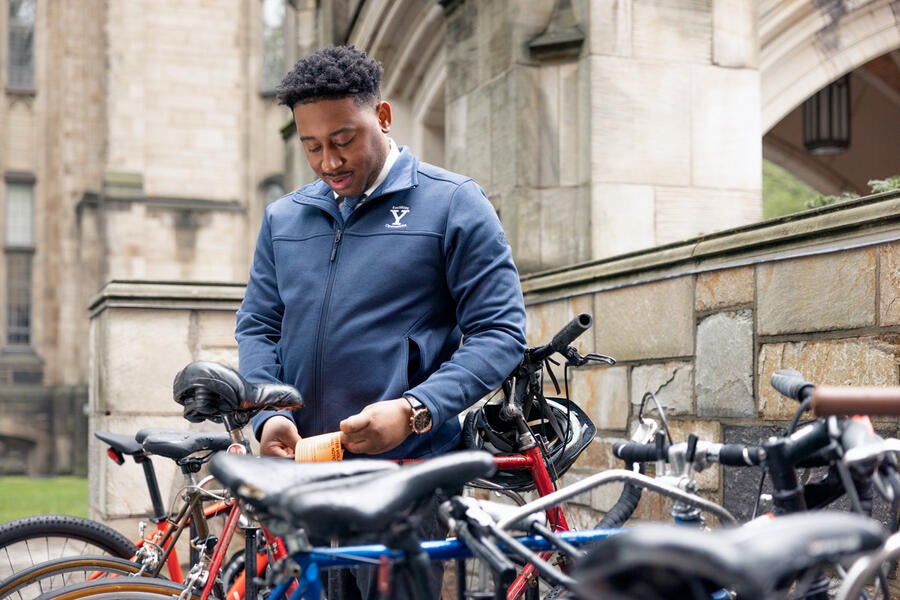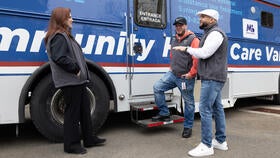
Spring is a time of rebirth and rejuvenation — when the winter’s dead leaves and muddy paths make way for pink dogwood trees, emerald-green lawns, and purple alliums. For abandoned bicycles — perhaps locked to poles and racks, with flat tires and chains rusted to a burnt orange — another kind of new life waits, thanks to a partnership between Yale Facilities and the Bradley Street Bicycle Co-op (BSBC).
Each year, Yale Facilities superintendents mark about 70 bicycles across central, medical, and west campuses with bright orange and red tags that alert owners of impending removal (within two weeks) if unclaimed. During the fall and winter, a few are tagged when found locked to railings, stairwells, or handicap ramps, compromising safety. But the majority are tagged in early May, as seniors prepare to graduate and other students leave for the summer.
In addition to the brightly colored notifications, the residential college deans’ offices send all students an email reminding them of the impending bike removals. At the end of the two weeks, the team at BSBC, a New Haven non-profit, gets a go-ahead signal from Facilities to cut the locks and bring the bikes to their shop, at 138 Bradley Street. BSBC stores the bikes for another two weeks, providing an extra grace period for forgetful or inattentive bike owners. Both the residential college operations managers and the Yale police know to route inquiries about missing bikes to the group.
After the waiting period, volunteers and mechanics at BSBC get to work, repairing all usable bikes. And if a bike is beyond repair, its working parts are used elsewhere.
Unlike a traditional retail bike operation, BSBC is a 501(c)3 non-profit organization run by a small staff, volunteer collective, and board of directors. Its mission is to provide bike access, education, and activities to the New Haven community. While some repaired bikes are sold, many others are donated to local groups that work with adults seeking employment or who may need a mode of transportation to a current job.
It’s a great feeling to know these didn’t end up in a landfill, and they are being used and enjoyed.
“The Yale team has been great in helping to make sure that these bikes go back into the community,” said Catherine Lindsay, operations manager at the co-op. “We have programs established with Integrated Refugee and Immigrant Services (IRIS) and the Connecticut Mental Health Center (CMHC), who reach out to us regularly when they need bikes donated to their clients.” CMHC serves individuals with serious mental illness or addiction, in partnership with the Department of Mental Health and Addiction Services and the Yale Department of Psychiatry; IRIS assists refugees by providing support during their transition to life in the U.S.
“These bikes are a lifeline to our patients,” said Joanna Perez, an occupational therapist at CMHC. “Many use them for transportation to a job, to stay connected to family and friends, and for health and wellness.”
Over the 5 years the program has been in place, 514 bicycles tagged by Facilities have been recycled with BSBC.
Partners in re-use
The program began in 2017, when Jeff Hughes, an area manager for Yale Facilities, decided to rethink the department’s approach to abandoned bicycles. At the time, Yale Facilities would remove these bikes and Yale Police would store and, if they were in good enough condition, eventually find a new home for them; bikes beyond repair were simply thrown out.
“The original program was labor intensive and costly, involving coordinating several departments to remove even one bike,” Jeff said. “We had to rent dumpsters and schedule staff to cut locks, transport the good bikes, and trash the rest.”
Jeff, now known by students and other Yale departments as “the bike guy,” credits the co-op’s “awesome” work for helping make the program successful: “They had the infrastructure to retrieve, repair and rehabilitate these bikes that benefit Yale, the local community, and the environment.
“Over the years, I’ve recognized bikes we’ve recycled that are still being pedaled around town. It’s a great feeling to know these didn’t end up in a landfill, and they are being used and enjoyed.”
Bradley Street Bicycle Co-op recycling program
Donate your old, unused, or broken bicycle: The co-op accepts donations of bikes and components in any condition. Individuals can bring bikes to the co-op, at 138 Bradley St., in New Haven, on Tuesday, Wednesday, and Thursday afternoons from 4:00 to 7:00 p.m. Since 2015, the group has repaired and sold or donated 3,690 bicycles that otherwise may have ended up in a landfill.






